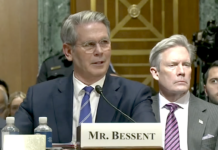
ATLANTA (GA Recorder) — The vast majority of Georgia parents can expect a little extra in their bank account starting Thursday as the federal government begins rolling out monthly payments of up to $300 per child as part of the pandemic stimulus package signed by President Joe Biden in March.
In what may be a preview of a line of attack from Democrats ahead of next year’s elections, Georgia Congresswoman Nikema Williams came out swinging at Republicans at a virtual press conference Wednesday touting the financial benefits.
The $1.9 trillion economic stimulus package expanding child tax credits passed the U.S. Senate 50-49, with no Republican support.
“I want to emphasize, again, that none of this would have been possible without the votes of Sens. Jon Ossoff and Rev. Raphael Warnock,” Williams said. “If Herschel Walker, Kelly Loeffler or any of the other people that they have on the GOP Senate candidate side challenging Sen. Warnock had their way, y’all, Georgia families wouldn’t be receiving these life-changing tax cuts. The child poverty rate in America wouldn’t be getting cut in half. That’s why we need to keep Raphael Warnock in the U.S. Senate next year, maintain Democratic majorities in the US House and Senate and elect new Democratic leadership for Georgia.”
Walker, a football star and ally of former Republican President Donald Trump, and Loeffler, who previously held Warnock’s seat, have expressed interest in running for the Senate, but neither has committed so far. Republican Agriculture Commissioner Gary Black is Warnock’s chief competition, for now.
Ossoff visited an Atlanta preschool late last month to promote the program. Georgia Congresswoman Carolyn Bourdeaux sent an email to constituents celebrating the 181,000 Georgians in her district north of Atlanta she says will benefit.
“Every child deserves an equal shot at success, and the American Rescue Plan’s expanded child tax credit takes a great step at ensuring a more equitable future,” Bourdeaux said.
In addition to helping them win at the polls, Democrats are hoping their expanded child tax credits will help parents like Shantrice Jones, single mom to a 6-year-old son in DeKalb County.
Jones, who works in public health, said she has struggled to balance getting work done with caring for her son.
“It was literally the hardest thing I’ve ever done,” she said at the press conference. “Many of my colleagues recommended that I should get child care to help with the mental load of trying to do it all. I looked into options that were available, and I simply could not afford it. I could not afford to pay for child care, pay all of my bills, and even pay for our basic necessities.”
Jones said she plans to use her tax credit toward child care and some other expenses for her son.
She was echoed by Courtney Driver, a Houston County Marine Corps vet who is raising her 5-year-old alone while the girl’s father, an Army reservist, is deployed.
“It’s just been the two of us, me and my daughter,” she said. “The stimulus payments that we received last year and this year were a great help in offsetting the cost of childcare and allowing us to have a safety net so that I could continue to work. I know that so many parents were and still are out of work due to this pandemic, and even though things are somewhat getting back to normal, we still have a long way to go.”
Williams said the payments will mean parents won’t have to worry about affording child care or other necessities and will be freed up to get back to work.
The tweaked tax credit could put money in the hands of up to 91% of Georgia families, cut national child poverty in half and lift 171,000 children in the state out of poverty, Williams said.
But the families that stand to benefit the most from the money could be the most likely to miss out.
Parents who filed a tax return in 2019 or 2020, or who received a stimulus check from the IRS are already signed up to receive the funds, but those whose income was too low to owe federal income taxes need to sign up on the IRS website. If they don’t, they could lose their chance to get the money.
In late April, a survey by the progressive polling group Data for Progress found 53% of likely voters knew either nothing or only a little about the expanded child tax credits. More people have likely become aware in the intervening months, but children potentially missing out remains a concern, Williams said.
“This is something that is critically important to me,” she said. “I did a national town hall with the NAACP two nights ago talking about the child tax credit. Every opportunity that I have, I am talking about the child tax credit. I sent out a mailer all across my congressional district so that people knew how to sign up. We need to continue to get the word out and make sure that people are getting the supports that are in place and available to them.”
The monthly direct payments are set to expire in December, with the rest of the payments coming after families file taxes in the spring. Members of the Democratic base have been pressuring Biden and Democratic leadership to make the cuts permanent.
An analysis by the Tax Foundation finds making the credits permanent would cost $1.6 trillion over 10 years.
Williams said she’s on board with making the expansion permanent, but details are still to come.
“We are currently working through that as we look at how to get more people on board with the cost associated,” she said. “But I’m of the mindset that when you cut childhood poverty in half, you don’t go back and reinstate it the next year. So this is something that is critically important to our colleagues in the House right now, and we’re working through the details on that.”







